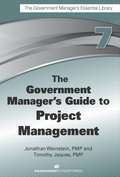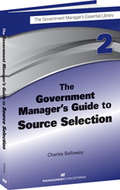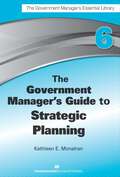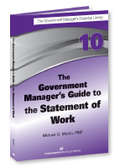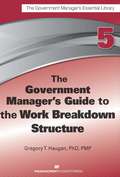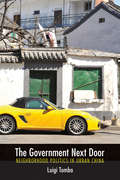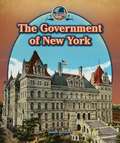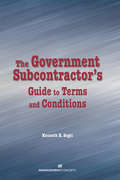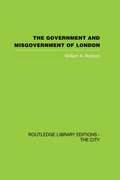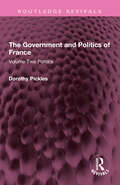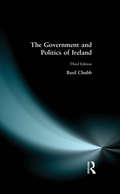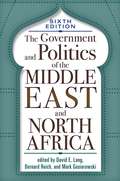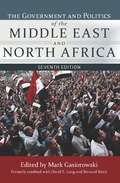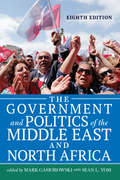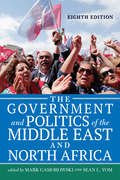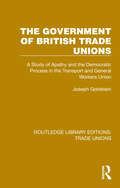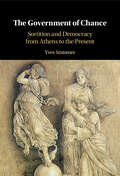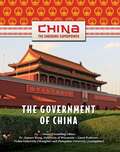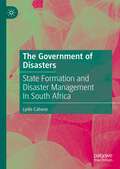- Table View
- List View
The Government Manager's Guide to Project Management
by Jonathan Weinstein PMP Timothy Jacques PMPThis realistic cross-section of the project management discipline in the federal arena will help anyone leading, working on, or affecting the direction of a project team. It covers the entire scope of project management from organization to methodology, technology to leadership. This volume focuses on the three project management organizational dimensions of culture, systems, and structure. Federal practices and successes in the areas of communication, project leadership, stakeholders, and key competencies are highlighted. The book offers clear and practical advice drawn from a variety of project management successes in the federal arena.
The Government Manager's Guide to Source Selection: GMEL series
by Charles D. Solloway Jr.To be effective, every government manager must have a working knowledge of the source selection process. Even the most carefully crafted contract cannot repair the adverse mission impact of making a poor source selection decision. This accessible guide provides the framework you need. Its practical approach and concise presentation make it to the go-to resource on source selection for busy government managers.
The Government Manager's Guide to Strategic Planning
by Kathleen E. MonahanStrategic planning deals with long-term goals and objectives. Performance management focusing on the performance of an organization, department, process, or employee—is what makes strategic planning work. Neither can be done without the other, but both must be adapted to the organization. This volume is designed as a reference for those involved in the day to-day challenge of performance management and measurement. Government managers will find ideas and practices that can be applied effectively in the federal environment.
The Government Manager's Guide to The Statement of Work
by Michael G. Martin PMPThis volume offers practical guidance on writing and preparing a description of government requirements, whether the document used is a statement of work (SOW), a performance work statement (PWS), or a statement of objectives (SOO). This description specifies exactly what good and services are being purchased, including their quality, requirements, quantity, and schedule for delivery, and also defines the relationship between the government and the contractor. From an overview of the elements that make a good SOW, to the methods for changing an SOW to meet new conditions, this is a hands-on resource for every government manager who is involved with contracts.
The Government Manager's Guide to the Work Breakdown Structure
by Gregory T. Haugan PhD, PMPThe Government Manager's Guide to the Work Breakdown Structure The work breakdown structure (WBS) is a cornerstone of managing any project. Every government manager should understand how to construct a WBS in the project or program lifecycle. This quick reference presents the fundamental WBS principles, pragmatic steps for the government manager to follow in developing a project WBS, and a checklist for the project manager to use in reviewing a WBS. In addition, DOD recommendations for avoiding pitfalls in constructing a WBS are highlighted.
The Government Next Door: Neighborhood Politics in Urban China
by Luigi TombaChinese residential communities are places of intense governing and an arena of active political engagement between state and society. In The Government Next Door, Luigi Tomba investigates how the goals of a government consolidated in a distant authority materialize in citizens' everyday lives. Chinese neighborhoods reveal much about the changing nature of governing practices in the country. Government action is driven by the need to preserve social and political stability, but such priorities must adapt to the progressive privatization of urban residential space and an increasingly complex set of societal forces. Tomba's vivid ethnographic accounts of neighborhood life and politics in Beijing, Shenyang, and Chengdu depict how such local "translation" of government priorities takes place. Tomba reveals how different clusters of residential space are governed more or less intensely depending on the residents' social status; how disgruntled communities with high unemployment are still managed with the pastoral strategies typical of the socialist tradition, while high-income neighbors are allowed greater autonomy in exchange for a greater concern for social order. Conflicts are contained by the gated structures of the neighborhoods to prevent systemic challenges to the government, and middle-class lifestyles have become exemplars of a new, responsible form of citizenship. At times of conflict and in daily interactions, the penetration of the state discourse about social stability becomes clear.
The Government Of New York (Spotlight On New York Series)
by James BernardThis fact-filled volume, which reflects the most current scholarship, examines the history of New York State’s government structure from its earliest roots to contemporary leaders. <br>• Topics addressed include early native governments and leadership, an explanation of the separation of powers, levels of state and national government, and what it means to be a good citizen. <br>• Includes the biographic information for notable New York State leaders. <br>• The book is richly formatted with full-color photographs as well as primary source documents that help bring the evolution of New York’s government into the spotlight.
The Government Subcontractor's Guide to Terms and Conditions
by Kenneth R. SegelNavigating Contract Terms and Conditions Just Got Easier!Organizations are at risk when contract terms and conditions are not fully understood. The Government Subcontractor's Guide to Terms and Conditions quickly guides you through the process of reviewing and negotiating contracts, identifying terms and conditions of concern, and mitigating potential risks. Author Kenneth Segel has tapped over 20 years of contract experience to write a handbook that walks even the most junior contracts administrator through the daunting task of reviewing and negotiating a government contractor's terms and conditions.This critical resource will help you• Determine what specific terms and conditions to address• Distinguish between a favorable and an unfavorable provision• Address potentially damaging provisions• Understand the potential economic impact of indemnification provisions• Apply risk management to address indemnification provisionsThe Government Subcontractor's Guide to Terms and Conditions will guide you through the inevitable challenges of the negotiation process. Put this updated resource to work in your organization today!
The Government and Misgovernment of London
by William A. RobsonThis book was first published in 1939.
The Government and Politics of France
by Andrew Knapp Vincent WrightThe Government and Politics of France has been the leading textbook on French politics for over a generation, and continues to provide students with a comprehensive and incisive introduction to the intricacies of French politics and government. This edition updates every chapter, with the addition of a new chapter on France and Europe. Recent events necessitate a new edition, particularly the 2002 elections and the growing interpenetration of France and the EU in student programmes, as well as in the real world.Whether covering the shifting balance within France's two-headed executive, the paradoxes of the French party politics, the power and fragmentation of France's administration, the growing assertiveness of French local government, or the newly visible world of the judiciary, The Government and Politics of France has always sought to confront established paradigms with the complex and untidy reality of French politics at the grass roots.
The Government and Politics of France: Volume One Institutions and Parties (Routledge Revivals)
by Dorothy PicklesFirst published in 1972 The Government and Politics of France: Volume One provides a comprehensive overview of the nature, theory, and practice of the French governmental system. It brings themes like the Constitution, the roles of the President and Prime Minister, the electoral system, parliamentary parties, and extra parliamentary groups in France. This book is a must read for students of French politics, political science, political institutions, and European politics.
The Government and Politics of France: Volume Two Politics (Routledge Revivals)
by Dorothy PicklesFirst published in 1973 The Government and Politics of France: Volume Two provides a comprehensive overview of French political history from 1958-1973. Dorothy Pickles writes with her characteristic elegance and the major themes are fully discussed and clearly related to their roots in earlier periods and to their consequences in later ones. The book covers the Algerian war and its aftermath; the notion of ‘participation’; educational reform; economic problems; regionalism; the changing nature of Gaullism; and in the field of foreign policy – attitudes of European Community; relations with the Atlantic powers and France’s attempts at achieving a world role. This book is a must read for students of French politics, political science, political institutions, and European politics.
The Government and Politics of Ireland
by Basil ChubbThe third edition of Government and Politics in Ireland has been updated to take account of the political developments that have taken place in Ireland between 1981 and 1991. Amongst the topics covered are political parties, pressure groups, the government and the Dail and local government.
The Government and Politics of the Middle East and North Africa
by David E. Long Bernard Reich Mark GasiorowskiThis is the sixth edition of this popular and important work which provides expert break-downs of the demographic, past and current political views, as well as current and upcoming political and ideological changes of the countries of the Middle East and North Africa. Edited by Long, a teacher, author and Middle East consultant, and Reich (political science, Louisiana State U. ), this edition comes completely updated, with new information on issues such as politics in post-war Iraq, Iran's nuclear policy, and the policies of post-Sharon Israel. The work includes data tables for each country and chapter bibliographies. Annotation ©2011 Book News, Inc. , Portland, OR (booknews. com)
The Government and Politics of the Middle East and North Africa
by David E. Long Bernard Reich Mark GasiorowskiThe Government and Politics of the Middle East and North Africa continues to provide comprehensive, up-to-date coverage of the domestic politics and foreign policies of all countries in this crucial region. An introductory chapter written by Mark Gasiorowski offers a comparative overview of the countries in the Middle East and North Africa to provide readers with preliminary traction in the region's political landscape. Invited specialists contribute authoritative overviews of the government and politics of each country using a common framework to create consistency throughout the book, examining each country's historical background, political environment, political structure and dynamics, and foreign policy. Chapters are augmented by a map of each country, a box providing crucial facts, and an annotated bibliography summarizing the major literature. The seventh edition has been revised throughout to reflect recent substantial changes in each country. In addition, the authors provide vital new considerations of major developments, including events related to the Arab Spring, the US pullout from Iraq, and the ongoing Arab-Israeli conflict.
The Government and Politics of the Middle East and North Africa
by David E. Long Bernard Reich Mark GasiorowskiThe Government and Politics of the Middle East and North Africa continues to provide comprehensive, up-to-date coverage of the region's critical contemporary events and issues. Invited specialists contribute authoritative overviews of the government and politics of each country in the Middle East and North Africa. As in previous editions, country chapters are systematically organized to address historical background, social and economic conditions, politics, and foreign policy, and each chapter features an updated data table for easy compare and contrast.The sixth edition has been revised throughout to reflect recent substantial changes in the Middle East and includes seventeen new maps and a new introductory chapter on the region. In addition, the authors provide vital new considerations of major developments, including Iran's nuclear policies; political dynamics in postwar Iraq; Israel's post-Sharon politics; the fragmentation of Palestinian representation between Hamas inGaza and Fatah in the West Bank; as well as recent developments in Syria, Turkey, and Lebanon
The Government and Politics of the Middle East and North Africa
by David E. Long Bernard Reich Mark GasiorowskiThe Government and Politics of the Middle East and North Africa continues to provide comprehensive, up-to-date coverage of the domestic politics and foreign policies of all countries in this crucial region. An introductory chapter written by Mark Gasiorowski offers a comparative overview of the countries in the Middle East and North Africa to provide readers with preliminary traction in the region’s political landscape. Invited specialists contribute authoritative overviews of the government and politics of each country using a common framework to create consistency throughout the book, examining each country’s historical background, political environment, political structure and dynamics, and foreign policy. Chapters are augmented by a map of each country, a box providing crucial facts, and an annotated bibliography summarizing the major literature. The seventh edition has been revised throughout to reflect recent substantial changes in each country. In addition, the authors provide vital new considerations of major developments, including events related to the Arab Spring, the US pullout from Iraq, and the ongoing Arab-Israeli conflict.
The Government and Politics of the Middle East and North Africa
by Editors David E. Long Bernard Reich Mark GasiorowskiNew editor Mark Gasiorowski joins David E. Long and Bernard Reich in providing comprehensive and up-to-date coverage of contemporary events and issues in this thoroughly revised edition. Invited specialists contribute their authoritative discussions of the several states of the Middle East and North Africa. Eight of the book’s sixteen chapters are contributed by new authors, infusing the fifth edition of The Government and Politics of the Middle East and North Africa with especially fresh perspectives on the region. New to this edition as well are fact sheets for each country, which provide key data in an easy-to-find and easy-to-use format, and five specially drawn maps, which provide students with more detail than previously on the region’s geography. The volume editors’ introductory chapter is thoroughly revised and thoughtfully expanded to provide a valuable overview of the region’s political systems. As in previous editions, chapters are structured according to a standard format that addresses in turn each country’s history, economics, politics, and foreign policy, facilitating comparison and contrast across countries. A guide to further reading concludes each chapter. More than ever before, The Government and Politics of the Middle East and North Africa, fifth edition, is the single most comprehensive and authoritative text for courses on the government, politics, and economics of the contemporary Middle East and North Africa.
The Government and Politics of the Middle East and North Africa
by Mark Gasiorowski Sean L. YomWith recent upheavals in the Middle East and North Africa, the eighth edition of The Government and Politics of the Middle East and North Africa has been thoroughly revised to provide a necessary, comprehensive and current examination of the domestic politics and foreign policies of this crucial region. A newly expanded introduction provides students with a comparative and thematic overview of the region, from its political regimes and electoral institutions to its economic and social concerns. Each chapter, written by an invited specialist, uses a common framework to explore the historical background, social and political environment, political structure and dynamics, and foreign policy of a country. Chapters are augmented by a country map, a box providing key facts, and an annotated bibliography summarizing the major literature.The eighth edition provides vital new considerations of the aftermath of the Arab Spring, the ongoing sectarian violence and rise of ISIS, and the growth of social forces like youth movements and women's rights groups. In addition, the inclusion of six new contributors brings fresh perspectives, ensuring that The Government and Politics of the Middle East and North Africa remains an essential guide to the region's political landscape.
The Government and Politics of the Middle East and North Africa
by Mark GasiorowskiWith recent upheavals in the Middle East and North Africa, the eighth edition of The Government and Politics of the Middle East and North Africa has been thoroughly revised to provide a necessary, comprehensive and current examination of the domestic politics and foreign policies of this crucial region. A newly expanded introduction provides students with a comparative and thematic overview of the region, from its political regimes and electoral institutions to its economic and social concerns. Each chapter, written by an invited specialist, uses a common framework to explore the historical background, social and political environment, political structure and dynamics, and foreign policy of a country. Chapters are augmented by a country map, a box providing key facts, and an annotated bibliography summarizing the major literature.The eighth edition provides vital new considerations of the aftermath of the Arab Spring, the ongoing sectarian violence and rise of ISIS, and the growth of social forces like youth movements and women's rights groups. In addition, the inclusion of six new contributors brings fresh perspectives, ensuring that The Government and Politics of the Middle East and North Africa remains an essential guide to the region's political landscape.
The Government of British Trade Unions: A Study of Apathy and the Democratic Process in the Transport and General Workers Union (Routledge Library Editions: Trade Unions #8)
by Joseph GoldsteinOriginally published in 1952, The Government of British Trade Unions analyses the government, in theory and in practice, of one of Britain’s most important labour organizations – The Transport and General Works Union in the first half of the 20th Century. It is an appraisal of the role of the rank and file within this union of over one million members, to determine both the opportunity for, and the extent of their participation in, this State within a State. Original sources and materials, which had not previously been made public in relation to any major British or American Trade Union, were used to ascertain member turnover, participation in elections, attendance at Branch meetings and the effect of the repeal of the Trade Disputes Act on Labour Party membership. The study is of great interest both for the light it throws on the general question of Trade Unions in the modern State, and for its analysis of the Transport and General Works Union itself.
The Government of Chance: Sortition and Democracy from Athens to the Present
by Yves SintomerElectoral democracies are struggling. Sintomer, in this instructive book, argues for democratic innovations. One such innovation is using random selection to create citizen bodies with advisory or decisional political power. 'Sortition' has a long political history. Coupled with elections, it has represented an important yet often neglected dimension of Republican and democratic government, and has been reintroduced in the Global North, China and Mexico. The Government of Chance explores why sortation is returning, how it is coupled with deliberation, and why randomly selected 'minipublics' and citizens' assemblies are flourishing. Relying on a growing international and interdisciplinary literature, Sintomer provides the first systematic and theoretical reconstruction of the government of chance from Athens to the present. At what conditions can it be rational? What lessons can be drawn from history? The Government of Chance therefore clarifies the democratic imaginaries at stake: deliberative, antipolitical, and radical, making a plaidoyer for the latter.
The Government of China (China: The Emerging Superpower)
by Yu BinSince its founding in 1949, the People's Republic of China has been a one-party state in which the Chinese Communist Party holds a monopoly of political power. Many Western students are unfamiliar with the structures, institutions, and ideologies by which the Party exercises this power. The Government of China examines those issues in depth. It also details the historical development of China's Communist government and explores recent trends, including signs that a more responsive, open system may be developing. This volume is essential reading for students who wish to understand one of the world's most important countries.
The Government of Desire: A Genealogy of the Liberal Subject
by Miguel de BeisteguiLiberalism, Miguel de Beistegui argues in The Government of Desire, is best described as a technique of government directed towards the self, with desire as its central mechanism. Whether as economic interest, sexual drive, or the basic longing for recognition, desire is accepted as a core component of our modern self-identities, and something we ought to cultivate. But this has not been true in all times and all places. For centuries, as far back as late antiquity and early Christianity, philosophers believed that desire was an impulse that needed to be suppressed in order for the good life, whether personal or collective, ethical or political, to flourish. Though we now take it for granted, desire as a constitutive dimension of human nature and a positive force required a radical transformation, which coincided with the emergence of liberalism. By critically exploring Foucault’s claim that Western civilization is a civilization of desire, de Beistegui crafts a provocative and original genealogy of this shift in thinking. He shows how the relationship between identity, desire, and government has been harnessed and transformed in the modern world, shaping our relations with others and ourselves, and establishing desire as an essential driving force for the constitution of a new and better social order. But is it? The Government of Desire argues that this is precisely what a contemporary politics of resistance must seek to overcome. By questioning the supposed universality of a politics based on recognition and the economic satisfaction of desire, de Beistegui raises the crucial question of how we can manage to be less governed today, and explores contemporary forms of counter-conduct. ?Drawing on a host of thinkers from philosophy, political theory, and psychoanalysis, and concluding with a call for a sovereign and anarchic form of desire, The Government of Desire is a groundbreaking account of our freedom and unfreedom, of what makes us both governed and ungovernable.
The Government of Disasters: State Formation and Disaster Management In South Africa
by Lydie CabaneThis book examines the history of disaster management in South Africa, showing how experts, professionals and policymakers have crafted and implemented disaster policies from the mid-twentieth century to the present day. It assesses the ways in which states become concerned with disasters, the extent to which disaster management contributes toward state formation, and who and what disaster management protects. It also considers the ways in which the politics of protection continuously shift as political regimes change. In telling the story of how policies surrounding disaster protection have evolved in South Africa, the book demonstrates how the security apparatus that shaped disaster management was re-oriented in the twenty-first century towards development, alongside bureaucratic reforms that aimed to democratize the state. By examining the wider context of the globalization of disaster management, it also highlights the often unrecognised role of experts from Africa, Latin America and Asia in shaping global disaster policies. The book will appeal to scholars and students of disaster governance, public policy, state formation, and African politics.
